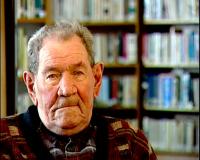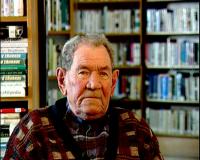People who want to climb up on your back are the sneaky ones

Download image
Imrich Brezanský was born on October 24, 1921 in the village of Maňa. As his father and grandfather passed away when he was only a child, he had to start helping her mother care for their homestead very soon. Despite various difficulties they managed their homestead very well in the period of the Czechoslovak republic; however, the situation changed after the year 1938, when their village was ceded to Hungary under the Vienna Award. His mother learnt foreign language when she had been in service in Budapest, Imrich was forced to learn it after being conscripted into Hungarian army in October 1942, when he joined up the 24th regiment in Transylvania. He didn’t experience ethnic persecution in army because Slovak and Hungarian soldiers had to live in equal conditions. He belonged to the Carpathian mountain border guard operating near the Romanian borders for two years; however, as a consequence of political-military development he was sent to the front in September 1944. Hungary wasn’t able to halt approaching Soviet troops, so Imrich and other soldiers were taken captives soon. At first he spent several weeks in concentration camp of Focsani at the Romanian borders, where were about five thousand captives. There were really tough living conditions and their hope that their conditions would improve after being transported to Russia proved to be vain. Captives often died of cold, hunger, and exhaustion in Russia, but Imrich managed to survive as he served in a camp in Chelyabinsk as an interpreter. From May 1945 he and several captives of Hungarian origin worked in a factory producing army tanks. Shortly after the end of war in Europe, the Soviet Union began releasing captives and Imrich was sent home from the Soviet Union in the second transport in October 1945. When they were going through Budapest, he took the earliest opportunity and set out for his own way home, where he managed to arrive on November 25, 1945.

